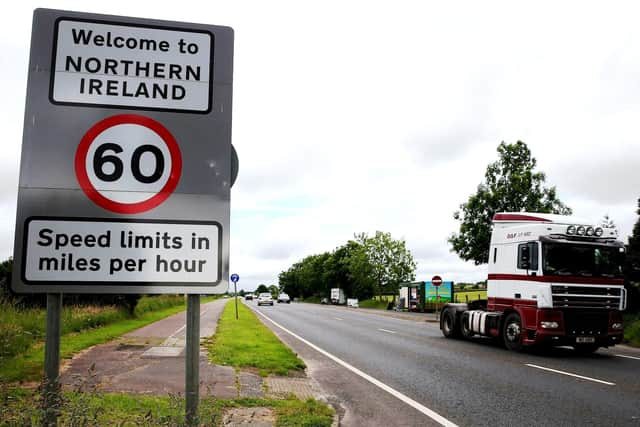Academic disputes ‘pessimistic’ paper on cost of united Ireland
and live on Freeview channel 276
‘Northern Ireland Subvention: Possible Unification Effects’ by Professors John FitzGerald and Edgar Morgenroth of TCD and DCU respectively claims that the reunification of Ireland would come at considerable cost due to the North’s low productivity and the requirement, the authors say, of continuing to subsidise the six counties by way of an annual subvention for decades.
“Even though Ireland has higher national income, funding the needs of the people of Northern Ireland in a united Ireland would put huge financial pressure on the people of Ireland, resulting in an immediate major reduction in their living standards.
Advertisement
Hide AdAdvertisement
Hide Ad"If, instead, Northern Ireland made major changes in its economy designed to dramatically raise productivity, over time this would narrow the gap in living standards between Northern Ireland, the rest of the UK and Ireland.


"In turn, this would reduce the Northern Ireland deficit and also reduce the cost of applying similar standards in Northern Ireland to those in Ireland. This could substantially reduce the cost of unification,” the economists conclude.
The academics acknowledge that ‘no account is taken of the wider economic effects of Irish unification, effects which would themselves have major implications for the public finances in both parts of the island’.
Their paper draws on the work of Ulster University economist Dr. Esmond Birnie and refers to a contest of ideas on the significance of the subvention between Dr. Birnie and Professor John Doyle, Vice President for Research in DCU.
Advertisement
Hide AdAdvertisement
Hide AdProf. Doyle’s 2021 paper in the journal Irish Studies in International Affairs, ‘Why the ‘subvention’ does not matter: Northern Ireland and the all-Ireland economy’ received a reply from Dr. Birnie in 2023, entitled, ‘The Subvention Matters: A Response to “Why the ‘subvention’ does not matter: Northern Ireland and the all-Ireland economy’.
Professors FitzGerald and Morgenroth using, 2019, as a baseline, suggest unification would add around 5 per cent of Gross National Income * to the Irish government’s deficit, rising to almost 10 per cent of GNI* if welfare entitlements and public sector pay were upgraded in the North to levels currently enjoyed in the South.
In a short response to the new paper on X, Prof. Doyle argues that it ‘takes such a pessimistic view of change than its conclusions are not reasonable’.
He writes: "The £10b subvention taken as a starting point, includes over £1.1b of additional defence exp (nuclear weapons), £1.6b of UK debt (no legal liability) and £3.5b of pensions exp (based on UK contributions).
Advertisement
Hide AdAdvertisement
Hide Ad"Tax adjustments due to the methodology used, and a move to the Irish tax system (which is better for low to middle paid but taxes top 30% of earners at a higher level) would also reduce the day one deficit.
"Day one deficit of a united Ireland (on today's figures) would be £1.3b if the UK pay their pension liabilities, in the same way they pay people living in the Republic (or Spain) today, and would be £4.5b if they do not pay any pensions at all.”
The DCU academic goes on to argue that the report takes little account of the potential economic benefits of reunification.
"The report mentions the possibility of economic change, but the headline figures assume no change at all. The UK is a highly centralised economy, with only London producing a fiscal surplus. There is no trajectory of 'catching up' for NI or indeed other UK regions incl. Wales.
Advertisement
Hide AdAdvertisement
Hide Ad"Jobs based on FDI in NI are at 20 per cent of the level in the South (after allowing for population differences) and productivity per worker is 40 per cent lower than the south (after allowing for MNC [multinational corporation] distortions), which leads to a low wage private sector economy.
"There is no reason to believe that with the same tax and policy model as the South that NI would remain such a weak economy, compared to say Cork and Kerry. If they reached that level no subvention would be required, and productivity, wages and living standards would improve,” he states.
Professor Seamus McGuinness, a Research Professor of Economics at the Economic and Social Research Institute whose work is also quoted in the paper, points out that ‘subvention estimates vary widely depending on assumptions made’.
"Debating its potential size misses the point. Subvention only exists because of NI's low productivity. Low productivity, & any associated subvention costs, are reversible through proper investment & policy,” he posted on X.
Advertisement
Hide AdAdvertisement
Hide Ad"Identifying polices to improve the North’s productivity and reduceliminate any future subvention costs is the key challenge for any planning process aimed at smoothing a transition to unity. Planning for future constitutional change needs to begin in earnest.”
In their conclusion, however, Professors FitzGerald and Morgenroth insist it would take 20 years at least before the North caught up with the South.
“If Northern Ireland chose to remain in the UK indefinitely, by reforming its economy it would also greatly enhance its economic position within the UK, realising a substantial improvement in its relative standard of living.
"However, even under the most favourable circumstances with optimal policies, it is likely to be at least two decades before the productivity gap could be substantially narrowed.
Advertisement
Hide AdAdvertisement
Hide Ad"Nonetheless, the sooner such changes are implemented, the sooner the benefits will accrue to the people of Northern Ireland whether they remain in the UK or eventually join in a united Ireland,” they conclude.
Comment Guidelines
National World encourages reader discussion on our stories. User feedback, insights and back-and-forth exchanges add a rich layer of context to reporting. Please review our Community Guidelines before commenting.
